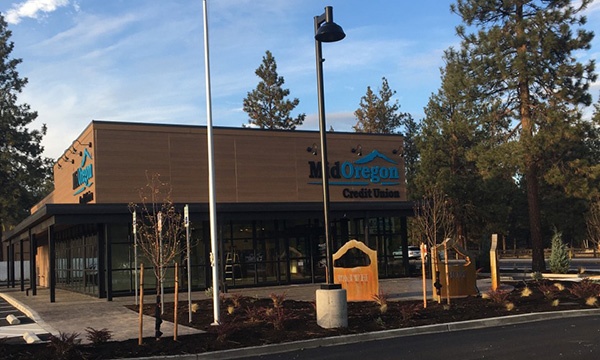The Bottom Line
Small business is important to Central Oregon, and to Mid Oregon. Find tips and resources for business, and information about Mid Oregon’s commercial services and business members.

Sisters Branch Is Now Open!
We are so exited to announce the opening of our newest branch location in Sisters! You can find our new location off Highway 20 at 650 N. Arrowleaf Trail, right next to McDonald’s. Our Sisters branch is now open!
This full-service branch offers drive-up lanes with ATM and video teller services, and the full range of loan and teller services inside. In addition, we will be adding a self-serve coin counting machine in the coming weeks.
Mid Oregon was proud to partner with Sunwest Builders, Taylor Northwest, and Steele Associates Architects to complete the new location. The design showcases the creativity of Sisters artisans and the beauty of the local landscape and features custom metal representations of the Three Sisters Mountains (Faith, Hope, and Charity) designed by Ponderosa Forge and Ironworks.
The new Mid Oregon Sisters branch is now open from 9 a.m. until 5 p.m., Monday through Thursday, and from 9 a.m. until 6 p.m. on Fridays. You’re invited to stop by and see our convenient new location!

Holiday Dough Crumbles Records in 2020
Although many things in 2020 haven’t gone according to plan, Mid Oregon members haven’t let that dampen their holiday spirit. Look no further than this year’s Holiday Dough fundraiser, which has already smashed every previous year’s total by several thousand dollars.
Responding to increasing community needs
Traditionally, Mid Oregon’s Holiday Dough fundraiser invites members to make small cash contributions at the branches to assist local food pantries with holiday meals. This year, we predicted the need would be greater—and the branch traffic would be lower.
So we introduced another option. We created an online form to make it easier for members to donate from their homes or offices. And they delivered! So far, members and the Mid Oregon branch teams have contributed more than $6,400. The record for a previous year fundraiser was $3,871 in 2018.
 Mid Oregon is proud to partner with these local non-profits to provide holiday meals for local families in need:
Mid Oregon is proud to partner with these local non-profits to provide holiday meals for local families in need:
- The Giving Plate of Bend, coordinating the Monthly Food Box program, Grow & Give Garden, Kid’s Korner food bank, and Backpacks for Bend.
- La Pine Christmas Basket Association, providing food during the Christmas holiday for people in the South Deschutes County area.
- Redmond Jericho Road, Providing hot meals, backpacks of food, emergency and housing assistance to those in need in the Redmond area.
- Jefferson County Food Bank (Madras), supplying food to families and individuals.
- Crook County Holiday Partnership—(Prineville), providing holiday support to families with children, senior and disabled citizens in need in Crook County.
- Sisters Kiwanis Food Bank – Distributing more than 60,000 pounds of food annually and helping more than 100 families each month, the food bank offers a shopping-style food pantry to patrons.
It’s not too late!
It’s still not too late to donate to Holiday Dough—use our convenient online form to transfer funds from your Mid Oregon account. Or, you can give us a call at 541-382-1795 and we’ll handle it over the phone.
Once again, our members show up to help, so we thank everyone who participated in Holiday Dough in 2020. We appreciate all you do to help local families have a brighter holiday season!

Year-End Tax Tips For 2020
By Jean Chatzky *
These year-end tax tips offer potential savings for your 2020 returns
Yes, it feels like we just finished filing our taxes. And yes, it’s already time to start thinking about them again. That means getting organized now and making sure you do everything you can to lower your 2020 tax bill before the end of the year.
Lisa Greene-Lewis, a certified public accountant and tax expert, offers these tips to help maximize savings on your 2020 returns:
Donate to Charity
If you are among the 90 percent of taxpayers who now take the standard deduction and don’t itemize your returns, including charitable donations, pay close attention. Under the CARES Act, Greene-Lewis says, there’s a new charitable deduction of up to $300 on your 2020 taxes (the ones you pay in 2021) for cash donations made to a 501(c)(3) organization such as a church or synagogue, even if you don’t itemize and claim the standard deduction.
Something else to note: The CARES Act also temporarily eliminates the limit on the number of cash contributions you can deduct when itemizing. And please don’t forget to ask for a receipt. The Internal Revenue Service requires proof of all cash donations, such as a canceled check or a statement or receipt from the organization where you made a contribution. This will come in handy if you are audited.
Maximize your retirement
Another way to reduce taxable income is to make a contribution to your retirement savings account. Whether your contribution goes to a 401(k) or traditional IRA, you can reduce taxable income (and save more for the future) by making sure you contribute the maximum allowed in your plan by Dec. 31, 2020. (Making a Roth IRA contribution is also good for your future, btw. It just won’t help on lower your tax bill.)
Pay tuition early
Being a lifelong learner has its rewards, especially when the courses you take help to maintain or enhance your job skills. If you are enrolled in an accredited college or other educational program, consider paying for the next semester’s tuition by Dec. 31 which could qualify you for a tax credit of up to $2,000 with the Lifetime Learning Credit.
Consider a home office tax deduction
Because of the COVID-19 global pandemic, many people’s employment status has changed, with a growing number of Americans becoming self-employed. The good news here is that eligibility rules for claiming a home office deduction have been relaxed, Greene-Lewis says, to allow more self-employed filers to claim the tax break. If you have no fixed location for your business, you can claim a home office deduction if you use the space for administrative or management activities, even if you don’t meet clients there.
While you can’t claim your kitchen if you are using your dining table as a desk, you can use a home office if the space is used exclusively for business, says Greene-Lewis, noting that many people have avoided the home office tax deduction because it was considered a red flag for an audit. If you legitimately qualify for the deduction, she says, there shouldn’t be a problem.
Defer your income or bonus
If you are in the enviable position of earning a year-end bonus in 2020, you can ask to be paid in January 2021, if it’s an acceptable practice at your company to pay bonuses the following year. Of course, you will still have to pay taxes on the money, just not in 2020.
Those who are self-employed or do freelance work may have a little more wiggle room with deferring reportable income. One way to lower 2020 income is to delay your invoices until late December so that you won’t receive a payment until January 2021 or later. For those with side gigs, you are required to report income of $600 or more from employers.
Double check your withholding
You can use the Tax Withholding Estimator on IRS.gov to help determine the right amount of tax to be withheld from your paychecks if you work for someone else. If you want to adjust your withholding for the remainder of the year, time is running out. You should submit a new Form W-4, Employee’s Withholding Certificate to your employer as soon as possible.
* This guest article, “Year End Tax Tips for 2020”, is from the “Your Money Blog” in Mid Oregon’s digital banking Credit Savvy resource. “Year End Tax Tips for 2020” is made possible by Savvy Money.
